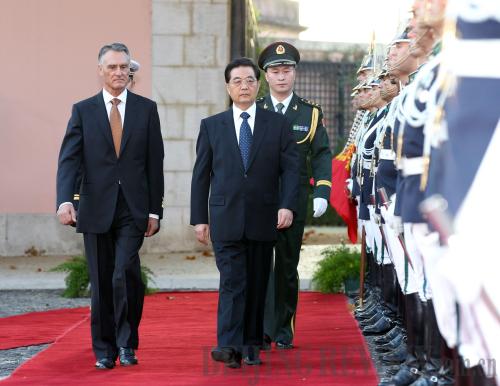|
 |
|
GUEST OF HONOR: Chinese President Hu Jintao reviews honor guards at a welcoming ceremony in Lisbon on November 6, along with his Portuguese counterpart Anibal Cavaco Silva (LAN HONGGUANG) |
Chinese President Hu Jintao's trip to France and Portugal on November 4-7 helped strengthen China's economic, political and cultural ties with the two countries and the entire EU.
The visit highlighted the importance of the Sino-French and Sino-Portugese relationships and the important economic links between the countries.
French visit
During the visit, China signed several economic cooperation agreements with France valued at about $20 billion. These included an order for 102 Airbus aircraft from France.
The China National Nuclear Corp. also signed agreements with AREVA, a large French nuclear power company. AREVA will supply 20,000 tons of uranium to China over the next 10 years at a value of $3.5 billion.
France also reaffirmed its readiness to cooperate with China in uranium mining, nuclear fuel production, nuclear power plant construction—including construction in third-party countries—and the processing and recycling of spent nuclear fuels.
China and France have already cooperated for 30 years in the field of nuclear energy, with France being a major supplier of nuclear energy technology in China.
Trade and economic exchange is the centerpiece of the Sino-French relationship, said Wang Shuo, a researcher with the China Institute of International Studies (CIIS). Bilateral trade is expected to reach $40 billion by the end of this year. During Hu's visit, the two countries announced a goal of doubling this figure to $80 billion by 2015.
France is experiencing slow economic growth, unemployment of about 10 percent and a budget deficit of about 7.5 percent. It is hoping to speed up its economic growth by "hitchhiking on China's economic express," Wang said.
"French producers, from motor producers to wine sellers, today all pay great attention to the potential of the Chinese market," he said.
China's GDP growth rate is expected to reach 10 percent this year, in contrast to 1.6 percent for France. Although France's growth rate this year is an improvement over its dismal rate of minus 2.2 percent in 2009, the French president is still under heavy pressure to make improvements in the economic and social fields, Wang said.
Although economic cooperation may be the linchpin of the relationship, political considerations are also important to both sides.
Since France will host a summit of the Group of 20 (G20) major economies in 2011, it wants to make the summit successful, said Zhang Jian, Deputy Director of the Institute of European Studies of the China Institutes of Contemporary International Relations (CICIR). It wants to coordinate with China so the summit can achieve agreements on major topics such as reform of the international monetary system.
"China and France are obviously paying more attention to each other," Zhang said. In his view, the frequency of high-level exchanges between the two countries reflects a growing common understanding. Hu's visit marked the second meeting between the Chinese and French presidents this year. French President Nicolas Sarkozy visited China from April 28 to 30 this year.
The two countries are endeavoring to "build a new, mature and stable comprehensive strategic partnership based on mutual trust and mutual benefit and with a global perspective," Zhang said. These same goals were highlighted in a joint statement issued by the two countries during Hu's visit.
| 